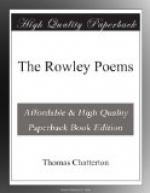Chatterton’s influence on the great body of poets of the generation succeeding his own was very considerable—Mr. Watts-Dunton indeed declares him to have been the father of the New Romantic School—and the affection with which Keats, Coleridge, Wordsworth and many others regarded him was extraordinary. He was their pioneer, who had lost his life in a heroic attempt to penetrate the dull crassness of the mid-eighteenth century.
He had great originality and the gift of an intense imagination. If he is sometimes crude and immature in thought and expression—if his images sometimes weary by their monotony—it is accepted that a poet is to be judged by his highest and not his lowest; and Chatterton’s best work has an inspiration, a singular and unique charm both of thought and of music that is of the first order of English poetry.
III. BIBLIOGRAPHY.
A great deal more has been written about Chatterton than it is worth anybody’s while to read. To begin with, there are all the volumes and pamphlets concerning themselves with the question whether the Rowley poems were written by Chatterton or by Rowley, or by both (Chatterton adding matter of his own to existing poems written in the fifteenth century), or by neither. It may be said that these problems were not conclusively and finally solved till Professor Skeat brought out his edition of Chatterton in 1871.
Then again there are the various lives of the poet; for the most part mere random aggregations of such facts, true or imagined, as fell in the editor’s way, filled out with pulpit commonplaces and easy paragraphs beginning ‘But it is ever the way of Genius ...’ Professor Wilson’s Chatterton: a Biographical Study is as final in its own way as Professor Skeat’s two volumes. It is a scholarly compilation of all previous accounts, very well digested and arranged. Moreover, the Professor has for the most part left the facts to tell their own story; and thus his book is free from such absurdities as the sentimental regrets of Gregory and Professor Masson that Chatterton was led into a course of folly ending in suicide through being deprived of a father’s care. Such a father as Chatterton’s was!
While premising that any one who wishes to learn the facts of the boy-poet’s life—his circumstances and surroundings—can find them all set forth in Professor Wilson’s book: while equally if he is interested in the pseudo-Rowley’s language, philologically considered, he will find this elaborately examined in Professor Skeat’s second volume; it has been thought that the following bibliography of books dealing with various aspects of the poet which were read and valued in their day may be found of interest to students of literary history.
1598. Speght’s edition of Chaucer, the glossary of which Chatterton used in the compilation of his Rowley Dictionary.
1708. Kersey’s Dictionarium Anglo-Britannicum, and




